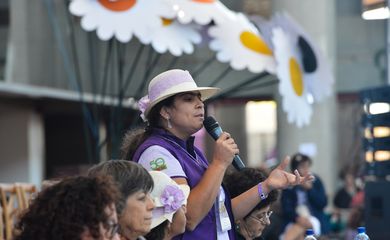Margaridas' March stands up for strengthening of democracy




The Margaridas' March, a rally of rural women workers, has gathered thousands of protesters at the Esplanade of Ministries
The Margaridas' March, a rally of rural women workers, gathered thousands of protesters at the Esplanade of Ministries and on the grass outside the Congress building on Wednesday (Aug. 12). Inspired by the union leader Margarida Maria Alves murdered 32 years ago, the march makes demands related to women's rights, better conditions for the rural life and the strengthening of democracy.
Wearing straw hats ornate with flowers, already a symbol of the march, the peasants were supported by urban organizations, big labor unions and other social movements. "It's important to have women from around Brazil joining the movement because this march claims rights for every woman, not only peasant women. We insisted on gathering more than 2,000 women here in Brasilia to represent us and strengthen the margaridas," said the leader of the Public School Employees Association in the Federal District, Antônia da Costa Sousa.

"We have come to claim our rights, we can not stand still there in the farms. When we come here among so many people, we see the women's importance and strength. "
Salete Schmidt, a peasant from Santo Amaro da Imperatriz in the state of Santa Catarina, said she had traveled 30 hours to the capital to demand more public policies for small producers. "I'm marching for better conditions for men and women in the field, peasants need to be noted because agriculture moves everything and it hasn't been recognized. We are always seeking funds and we are just little noted," she said regretfully.
In Vania Maria's view, from the municipality of Mirabela in Minas Gerais, the demonstration puts the government decisions under pressure. "We have come to claim our rights, we cannot stand still there on the farms. When we come here among so many people, we see the women's importance and strength. "
The march brought together family farmers, indigenous, quilombolas (descendents of slaves), members of riverside communities and miners from across the country. Despite its name, the rally is not exclusively female and is attended by many men, including union leader Valderi Alves de Paula from São Mateus in the state of Maranhão.
"When we come here, we turn into Margarida Alves. She left a legacy behind, she did not die, she is immortalized in our demands. Many social rights were granted by this march, so we are here to support the march. As a shop steward, I suffer when I see a woman in a land reform settlement fetching water at the landowner's house, it hurts me. For that reason the battle is also ours," he mentioned.
Along the way, among flags of the Brazilian states, there were banners from entities and associations supporting the march, including messages against racism, gender discrimination, violence against women, in addition to historical claims as the defense of land reform and the prohibition of pesticides use.
As they walked by the Ministry of Finance, the protesters demanded funds for rural credit and field programs for family farms. There were shouts in defense of Petrobras and political reform with people's involvement. They also criticized protests asking for President Dilma Rousseff's impeachment.
"More than ever, the march fulfills its role to tell this country that democracy means to respect what the polls decided last year. We need to keep changing effectively, clarifying the challenges we need to face ahead," said Alessandra Lunas, from the National Confederation of Agricultural Workers (Contag in the Portuguese acronym).

"More than ever, the march fulfills its role to tell this country that democracy means to respect what the polls decided last year. We need to keep changing effectively, clarifying the challenges we need to face ahead,"
According to her, the marching date had been set in 2014 and they had no intention to counter the anti-government protests scheduled for next Sunday (Aug. 16). "We launched the march in November last year, and we set its date. We didn't know what situation the country would be faced with. We couldn't imagine we would be on the streets today and we need to show we choose a side in this process. Since neoliberalism, the march has been on the streets voicing our thoughts at all times. We've never hidden we stand for."
In front of the Congress building, the march leaders performed an act of repudiation against the approval of projects reducing women's participation in politics and they demanded congressmen's commitment to projects that improve the conditions of life and work in the field. In the Senate, a solemn session paid tribute to the margaridas and about 200 demonstrators could get in to participate.
After the act in front of the Congress building, the march dispersed and just before 12pm, the margaridas began the journey back to the National Stadium by bus.
Translated by Amarílis Anchieta
Fonte: Margaridas' March stands up for strengthening of democracy



